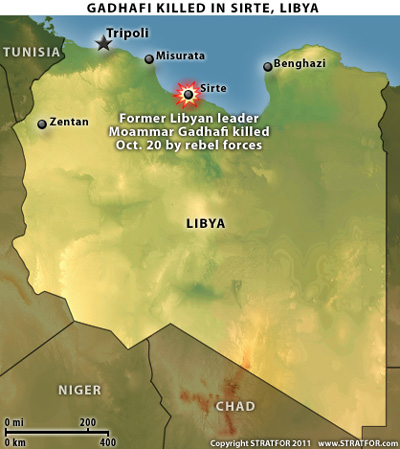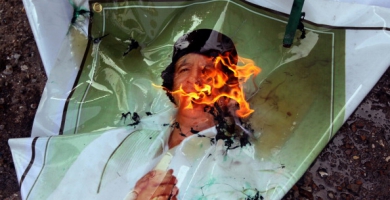--- Full Article Enclosed --- | |||
Gadhafi's Death in PerspectiveGadhafi’s death is symbolically important for the rebels, but the fall of Sirte is even more significant for the effect it will have on the future stability of Libya. With the final holdout of the pro-Gadhafi resistance overtaken, the National Transitional Council (NTC) can now move to form a transitional government. But multiple armed groups across the country will demand a significant stake in that government, which will have serious implications for the future unity of the people who heretofore were referred as the Libyan opposition.  Though the Benghazi-based NTC has been widely recognized in the international community as the sole legitimate representative of the Libyan people, this has long since ceased to be the case in the eyes of many Libyans. The NTC is one of several political forces in the country. Since the rebel forces entered Tripoli on Aug. 21, there has been a steady increase of armed groups hailing from places such as Misurata, Zentan, Tripoli and even eastern Libya itself that have questioned the authority of leading NTC members. Though the Benghazi-based NTC has been widely recognized in the international community as the sole legitimate representative of the Libyan people, this has long since ceased to be the case in the eyes of many Libyans. The NTC is one of several political forces in the country. Since the rebel forces entered Tripoli on Aug. 21, there has been a steady increase of armed groups hailing from places such as Misurata, Zentan, Tripoli and even eastern Libya itself that have questioned the authority of leading NTC members.These groups have been occupying different parts of the capital for two months now, despite calls by the NTC (and some of the groups themselves) to vacate. They also have been participating in the sieges of cities in which pro-Gadhafi remnants continued to hold out after the fall of Tripoli. Throughout this period, the NTC has repeatedly delayed the formation of a transitional government, in recent weeks citing the ongoing fight against Gadhafi as the reason. NTC leaders said that once the war was finally over, the official “liberation” of Libya would be declared and a transitional government would be formed. The fall of Sirte means this moment is at hand. With so many armed groups operating in Tripoli and elsewhere in Libya, a peaceful resolution to the question of who should take power is unlikely. The main groupings come from Benghazi, Misurata, Zentan and Tripoli, but there are other, smaller militias as well that will want to ensure they are represented in the new Libya. The divide is not simply geographic but also exists between Islamists and secularists as well as between Berbers and Arabs. The shape of the new Libya is highly uncertain, but what is clear is that the NTC is not going to simply take control where Gadhafi left off. Certain members of its leadership may play a key role in any transitional government, but not without serious compromises or, even more likely, violence occurring in the process. Pro-Gadhafi tribal elements in the last region to fall to rebel fighters also will be a potential source of violence in the coming months, as they will fight to make sure they are not left out of the future power structure. View more of our coverage on Gadhafi » | |||
Thursday, October 20, 2011
STRATFOR: Gadhafi's Death in Perspective
Subscribe to:
Post Comments (Atom)

No comments:
Post a Comment